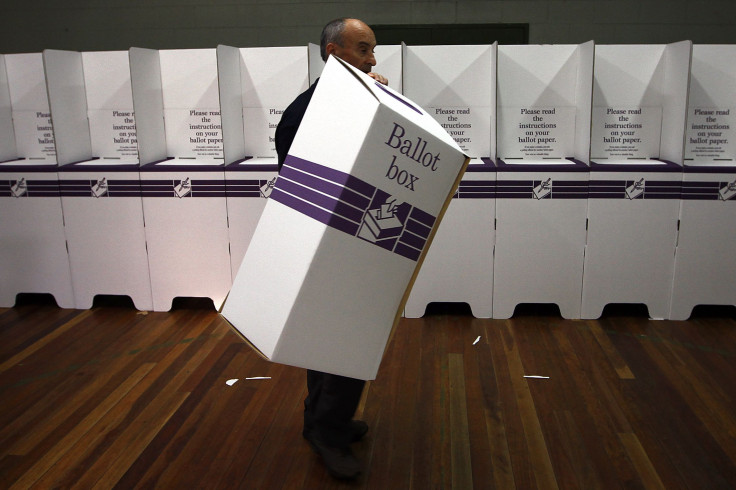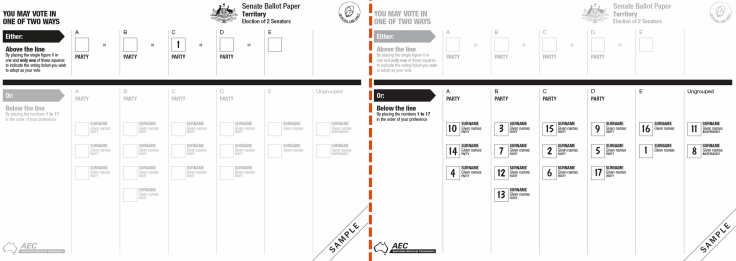Senate voting reform filibuster lasts 28 hours, amendments eventually pass

Update: The government's senate voting reform amendments have passed 36-23 after a 28 hour long vote. The amendments will apply from July 1, paving the way for the government to call a double-dissolution election on July 2.
Discussion in the Senate over the government’s proposed voting reforms has run through the night and into Friday morning, with the Labor Party and independent senators filibustering the series of amendments.
The marathon session began at 9.30 AM on Thursday and has so far continued for over 26 hours straight, with total discussion time for the amendments fast approaching 40 hours.
Wait, but why?
Under current electoral rules, a voter can cast a vote either above or below ‘the line’. ‘The line’ refers to the division of the boxes for each party and the boxes for each individual candidate.

Currently, a voter may vote for a single party above the line, or number the boxes for every candidate below the line. If a voter opts for the first choice and their chosen party does not win any seats, their vote is redistributed as specified by that party.
Thus if a voter wishes to determine the preferences for their vote, they must list their preference over one hundred candidates below the line.
The government’s proposed amendments include preferential voting for parties above the line, with a minimum of six preferences needed for a vote to count, as well as the option of preferential voting for as few as 12 candidates below the line.
Furthermore, party preference lists will be abolished, meaning that a vote would be exhausted if none of the six preference parties of twelve preference candidates win a seat. However voters are still free to preference more parties or candidates than the minimum requirements.
The government’s amendments are set to pass, with the pledged support of the Greens and independent senator Nick Xenophon. Despite this, the majority is not large enough to gag debate in the senate, which has gone on through the night.
What sort of PJs do our pollies wear? Here's @Nick_Xenophon as the Senate continues its marathon run. Pic @ FJKeary pic.twitter.com/HGrC6iqzxn
— Lisa Wilkinson (@Lisa_Wilkinson) March 17, 2016
For all those worried about #SleeplessSenate hygiene, the Gov started an OPT IN shower roster at 8:52am, 16hrs in. pic.twitter.com/cvq0AivTRZ
— Alice Workman (@workmanalice) March 18, 2016
Opponents to reform argue plan will squeeze out smaller parties, independents
The Labor Party and the remaining independent and micro-party senators have vocally opposed the amendments since they were introduced.
The Labor Party fears that the new rules will allow the coalition government to gain control of the senate, while the crossbench independent and micro-party senators are concerned that the rules will force them to lose their seats.
At the 2013 federal election, Victorian senator Ricky Muir of the Australian Motoring Enthusiasts Party was elected despite winning just 0.5 percent of the first-preference vote. He won because his party was awarded the preferences of a large number of other micro-parties, who had formed an alliance of over 30 parties with the so-called “preference whisperer” Glenn Druery.
The 22 feeder parties arranged by Glenn Druery NSW 1999 elected Outdoor Rec from 0.2% #senatereform pic.twitter.com/jCE9bi4FMt
— Antony Green (@AntonyGreenABC) March 17, 2016
The government has refused to postpone discussion of the amendments despite filibustering by the Labor party and independents, with Finance Minister Matthias Cormann taking a leading role in defending the amendments throughout the ongoing debate.
“If you still want to be here on Easter Friday, on Good Friday, that's fine,” he announced to the senate.
“The only people who get advantaged by this reform are voters.”
Labor’s deputy leader in the senate, Stephen Conroy, had told ABC News24 that “things did get short and colourful last night, but [the government] are de facto introducing a first pass the post voting system for the Senate.”
“You can just vote one, advocate to just vote one, no consequences and you will see 3.4 million Australians disenfranchised—their votes will not be used ultimately to determine who gets elected to the Senate.”
“That is exactly what this Government would like us to do, just for us to go home, just to let this filthy deal go through without the scrutiny it deserves,” said Labor senator Deb O’Neill during the vote.
“But we will not allow that to happen.”
Attacked throughout the vote for both her “state of consciousness” and her political past, Greens senator Lee Rhiannon commented, “how could you come in here and speak against voters having the right to decide their preferences?”
"This whole episode will be recorded as disgraceful for Labor when the history of this period is written.”
Palmer United senator Dio Wang also slammed the amendments, noting the threat to minor parties such as his own.
“It is nothing more than a Senate restructure, because, simply put, this bill does nothing more than make sure that small political parties face an even greater hurdle to be elected,” he said.
“It does nothing more than make sure that the one-quarter of voters who chose not to vote for the coalition, the Labor Party and the Greens cannot be represented in the Senate.”
Micro-party senators Ricky Muir, Bob Day and David Leyonhjelm have continued to debate and propose additional amendments alongside the Labor Party.
Leyonhjelm today described the reforms as “straight out of the authoritarian handbook,” likening them to the rule of Zimbabwean dictator Robert Mugabe.
Independent senator Jacqui Lambie, meanwhile, left parliament to attend a meeting, effectively admitting defeat.
“It’s a done deal,” she told the AAP. “There’s nothing more for me to say [...] so I’m getting on with the job.”
Senate cracks under marathon sitting
At times, the long debate descended into nonsense, with senators showing visible signs of exhaustion.
”I’m actually witnessing in my mind, a political colonoscopy,” said Labor senator Glenn Sterle.
“I’ve actually had one, and I was wide awake, so I really get this. How brave is that? Wide awake, because I did not want to wake up with them doctors giving me a surprise, in the area that they were saying.”
Liberal senator Cormann, who was born in Belgium, replied: “I know this at times can sometimes be a wide-ranging debate, but I’m not sure how Senator Sterle’s colonoscopy relates to the amendment before the chair.”
Sterle then snapped: “I’m getting to it you big sook […] don’t give me orders you big Belgian waffle!”
Other Labor senators also referenced Monty Python’s “The Holy Grail” and the Wiggles.
Labor senators Conroy and Sam Dastyari also made light of Greens leader Richard DI Natale’s recent GQ magazine photoshoot.
“Senator Di Natale in those fancy pants, walking the cat walk,” commented Conroy.
Throughout the vote, senators from all sides tweeted their dissatisfaction.
I'm tweeting during Labor filibuster. Conroy playing candy crush during answer by Defence Minister on defence issues https://t.co/Yd3rHI7duI
— Mathias Cormann (@MathiasCormann) March 17, 2016
@MathiasCormann kidding yourself if you think there is a set time this will end. Should have scheduled proper debate. Not rushed through.
— Sam Dastyari (@samdastyari) March 17, 2016
It's now 2.45am_ & in the 922 days since my election not 1, kaput__zero constituents in #NT have raised #SenateReform w/ me #SenateSleepover
— Senator Nova Peris (@NovaPeris) March 17, 2016
my workplace rn pic.twitter.com/FVD7ToXTNw
— Scott Ludlam (@SenatorLudlam) March 17, 2016
Hoping to catch my 6.35 pm plane Friday night. Not confident though. https://t.co/iuhEx8VZbO
— David Leyonhjelm (@DavidLeyonhjelm) March 17, 2016
Correction: This atricle previously stated incorrectly that independent Senator Glenn Lazarus had left the chamber before the final vote. Senator Lazarus was present for the vote.




















